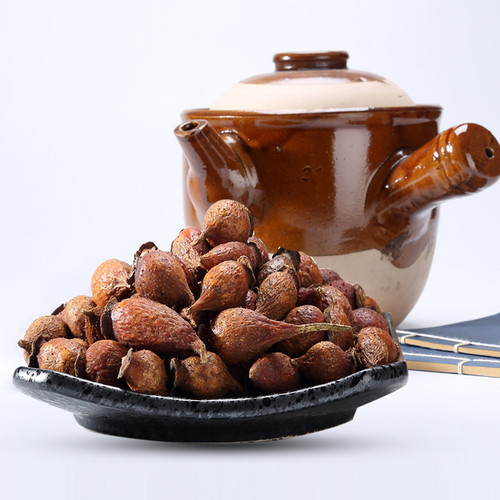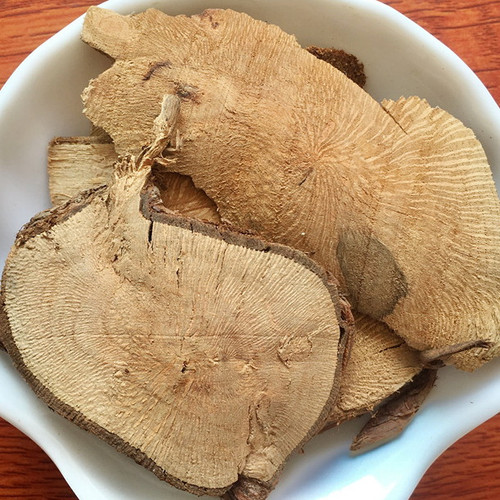Product Overview
Parts used: Dried ripe fruits
TCM category: Herbs that stabilize and bind
TCM nature: Neutral
TCM taste(s): Sour Sweet
Meridian affinity: Bladder Kidney Large intestine
Scientific name: Rosa laevigata
Other names: Rosehip
Use of cherokee rose fruits (Jin Ying Zi) in TCM
Please note that you should never self-prescribe TCM ingredients. A TCM ingredient is almost never eaten on its own but as part of a formula containing several ingredients that act together. Please consult a professional TCM practitionner, they will be best able to guide you.
Preparation: Harvest when the fruit is ripe and red and dry it.
Dosage: 6 - 9 grams
Main actions according to TCM*: Controls Essence. Astringes the Intestines and stops diarrhea. Decreases urination.
Primary conditions or symptoms for which cherokee rose fruits may be prescribed by TCM doctors*: Spermatorrhea Urinary incontinence Enuresis Abnormal uterine bleeding Leukorrhea Dysentery Diarrhea
Contraindications*: Not for acute conditions caused by Excess Heat.
Common TCM formulas in which cherokee rose fruits are used*:
For nocturnal emissions and urinary incontinence combine cherokee rose fruits with foxnut seeds (Qian Shi).
For Spleen deficiency with chronic diarrhea combine cherokee rose fruits with codonopsis roots (Dang Shen), atractylodes rhizomes (Bai Shu) and yam (Shan Yao).
For vaginal discharge due Kidney deficiency combine cherokee rose fruits with lotus stamens (Lian Xu) and foxnut seeds (Qian Shi).
Key TCM concepts behind cherokee rose fruits (Jin Ying Zi)'s properties
In Traditional Chinese Medicine (TCM), cherokee rose fruits are plants that belong to the 'Herbs that stabilize and bind' category. This category of herbs is used for treating abnormal discharges and displacement of organs. This includes conditions such as diarrhea, discharges from the vagina, penis or rectum as well as prolapse of the uterus or rectum. It is important to note that herbs in this category only treat symptoms, so one should also use herbs to treat the underlying Deficiency.
Furthermore cherokee rose fruits are plants that are Neutral in nature. This means that cherokee rose fruits typically don't affect the balance in your body. Balance between Yin and Yang is a key health concept in TCM. Eating too many "Hot" (Yang) ingredients can lead to an imbalance whereby one has a Yang excess. The inverse is true as well: too many "Cold" (Yin) ingredients can lead to a Yin excess. The Neutral nature of cherokee rose fruits means that you don't have to worry about that!
Cherokee rose fruits also taste Sour and Sweet. The so-called "five elements" theory in Chinese Medicine states that the taste of TCM ingredients is a key determinant of their action in the body. Sour ingredients like cherokee rose fruits help with digestion and restrain abnormal discharges of fluids from the body, such as diarrhea or heavy sweating. On the other hand Sweet ingredients tend to slow down acute reactions and detoxify the body. They also have a tonic effect because they replenish Qi and Blood.
The tastes of ingredients in TCM also determine what organs and meridians they target. As such cherokee rose fruits are thought to target the Bladder, the Kidney and the Large intestine. In TCM the impure water collected by the Kidneys that cannot be used by the body is sent to the Bladder for storage and excretion as urine. The Kidneys do not only regulate the urinary system but also play a key role in the reproductive system and the growth and aging process of the body. The Large Intestine receives the "impure" parts of the digested food from the Small Intestine, absorbs the remaining fluids and excrete the remainder as feces.
Use of cherokee rose fruits (Jin Ying Zi) as food
Cherokee rose fruits are also eaten as food.








